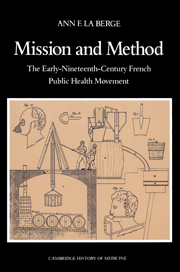Book contents
- Frontmatter
- Contents
- List of tables and illustrations
- Preface
- Acknowledgments
- Introduction
- I Community, method, context
- Chapter 1 Public health and the community of hygienists
- Chapter 2 The methodology of public hygiene
- Chapter 3 The context of public hygiene: National public health policy
- II Carrying out the mission: Institutionalization, investigation, moralization, and practical reform
- III Public health before Pasteur
- Epilogue
- Appendixes
- Bibliographical Note
- Index
Chapter 2 - The methodology of public hygiene
Published online by Cambridge University Press: 17 September 2009
- Frontmatter
- Contents
- List of tables and illustrations
- Preface
- Acknowledgments
- Introduction
- I Community, method, context
- Chapter 1 Public health and the community of hygienists
- Chapter 2 The methodology of public hygiene
- Chapter 3 The context of public hygiene: National public health policy
- II Carrying out the mission: Institutionalization, investigation, moralization, and practical reform
- III Public health before Pasteur
- Epilogue
- Appendixes
- Bibliographical Note
- Index
Summary
French hygienists wanted to make public health a scientific discipline, by which they meant using observation, experimentation, and quantification to study public health problems. Placing problems in historical context also figured prominently in their method. In their methodological approach hygienists were greatly influenced by the empirical tradition of the Enlightenment, eighteenth-century developments in social statistics, and the recent numerical method articulated and practiced by clinician Pierre Louis. Charles Londe expressed the critical spirit hygienists hoped to bring to bear on the study of hygiene: “There is only one way to remove hygiene from every systematic influence: that is to circumscribe it [hygiene] within the rigorous limits of facts and to leave to the facts their natural relationships.” Emphasizing a quantitative approach, Villermé expressed a similar idea in his classic study of varying mortality rates in the French departments: “I am going to attempt to bring it [the whole question of the causes of differing mortality] to light by masses of incontestable facts, which for the first time will establish it [the answer] by measurement.”
Although a critical approach was not new to scientists, hygienists believed their method constituted a radical break with the way public health problems had traditionally been investigated. As they saw it, traditional Hippocratic hygiene had been scientific, or based on observation. But commentators during the centuries had abandoned the observational method that had characterized classical hygiene. Hygiene had become a sterile list of rules and theories transmitted uncritically from one generation to another.
- Type
- Chapter
- Information
- Mission and MethodThe Early Nineteenth-Century French Public Health Movement, pp. 49 - 81Publisher: Cambridge University PressPrint publication year: 1992

